Authored By – Dr. Mohan Dewan & Advocate Tushar Shrikhande
Trademark and Copyright Infringement: Jurisdictional Pitfalls in India
“Forum shopping” is the informal name given to the practice adopted by some litigants to have their legal case heard in the Court thought most likely to provide a favourable judgment. This practice is prevalent in India and can lead to disastrous consequences as was demonstrated in a recent judgment by the Delhi High Court in the case of World Wrestling Entertainment Inc. vs. M/s. Reshma Collection & Ors. So why is Delhi usually selected? The most probable reason is the mistaken belief that Delhi is the centre of Intellectual Property Courts and litigation in India.
In a suit for trademark and copyright infringement instituted by the World Wrestling Entertainment Inc. (“WWE”), the Delhi High Court recently ordered that the plaint be returned to the Plaintiff and the suit be presented at the appropriate Court. Referring to the principles of law relating to the place where a suit may be instituted, the Court denied that it had any territorial jurisdiction to try the present case.
The WWE, an American company, claimed that their trademark and copyright was being infringed by the defendant who was located in Mumbai and was selling garments and apparel such as T-Shirts bearing trademarks of the Plaintiff. Under the Indian Trademark and Copyright law, a suit may be instituted where the Plaintiff resides, works for gain or carries on business. In the present case however, the WWE did not have a branch office in India. The WWE alleged that it was carrying on its business in Delhi since their goods (WWE merchandise) were being sold online by WWE and the website was accessible by people/customers in Delhi.
The Court however held that in order to be said that an entity carries on business in a particular place, the following conditions need to be met:
- The entity must have an exclusive agent in that territory;
- The person acting as an agent of the entity must be an agent in the strict sense of the term;
- To constitute “carrying on business” at a certain place, the essential part of the business must take place in that place.
In the present case, no essential part of the plaintiff’s business was carried on at Delhi. The plaintiff had not even pleaded to having any branch office or exclusive agent anywhere in India, let alone in Delhi. Thus, the court held that “merely because the website of the plaintiff is accessible in Delhi is not sufficient to clothe this Court with jurisdiction.” Accordingly, the Court ordered that the Plaint be returned to the Plaintiff to be presented before a Court having jurisdiction.
Ideally, since WWE did not have a branch office/exclusive dealer in India, it should have instituted the suit at a place where the infringer was selling the infringing goods or where he resided, worked for gain or conducted his business. Thus, the suit might have proceeded properly had WWE instituted the suit at Mumbai.
Conclusion
Institute a suit for infringement of trademark or copyright only before a Court having territorial jurisdiction i.e. where you live, work for gain or carry on business or where the defendant resides or sells his wares.
R K Dewan & Co. has been a pillar in the field of Intellectual Property for over 79 years, offering trusted IP solutions across India and in 125+ countries. With offices in Mumbai, Delhi, Pune, Chennai, Kolkata, Bangalore, and Indore, our team of 175+ skilled professionals is dedicated to protecting and enforcing IP rights with precision and care.
We work closely with over 5,000 clients—Indian and international—guiding them through every stage of IP management. From filing and prosecution to litigation and portfolio management, RKD delivers results with a personal touch.
Our expertise in infringement analysis ensures that clients are not only protected against IP violations but also equipped with the insights needed to take swift legal action when necessary. Whether it’s patents, trademarks, copyrights, designs, or geographical indications, we help businesses turn their intellectual assets into strategic advantages.


